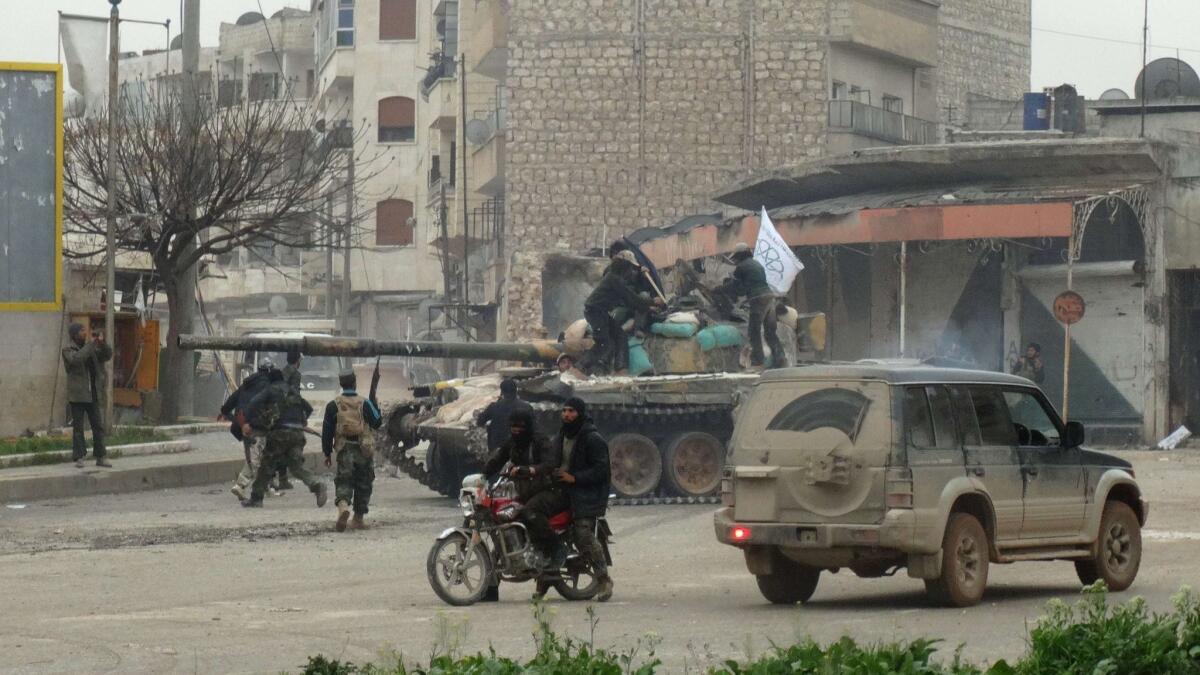Humanitarian groups fear aid is being diverted to terrorist group after militant takeover of Syrian province

- Share via
Beirut — The recent takeover of the Syrian province of Idlib by an extremist organization has created a dilemma for the United States and other countries that send humanitarian aid to civilians and military aid to various rebel factions fighting the Syrian government.
It has become impossible to provide assistance without inadvertently supporting Al Nusra Front, a former affiliate of Al Qaeda that has been deemed a terrorist group by the U.S. government.
But cutting off the aid could spur a humanitarian disaster among the estimated 2 million civilians who live in Idlib and derail efforts to topple Syrian President Bashar Assad.
The takeover comes as the Syrian government and its Russian and Iranian allies are threatening an all-out military assault on Idlib.
Though the province is part of a deconfliction zone established in May in U.N.-approved peace talks between rebel groups and the government, it is home to thousands of Assad’s most implacable foes, many of whom were shuttled in reconciliation deals from other besieged areas of the country over the last two years.
Al Nusra Front, which is also known as the Organization for the Liberation of Syria, was excluded from the talks and is not part of the deal. Its power grab could provide a pretext for Assad to attack in the name of eliminating the opposition forces arrayed against his government.
The group’s rise in Idlib began in 2015, when it and another hard-line Islamist faction, Ahrar al Sham, worked to together to defeat troops loyal to Assad and take over Idlib and the vital Bab al Hawa border crossing linking the province to Turkey, which generated millions of dollars a month in customs payments for the jihadis.
The two groups ruled the province together in an uneasy alliance until last month, when tensions between them escalated into open conflict. By late July, Ahrar al Sham had been booted from most of the province, leaving Al Nusra Front in control.
It wasted no time in asserting its newfound power, prohibiting the formation of any new rebel group in the area and banning tobacco products as part of an expansion of its strict version of Sharia law.
In the past, humanitarian groups and backers of the rebels fighting Assad had worked with Ahrar al Sham and the local councils that manage electricity, garbage collection and other services and serve as the main points of contact for aid distribution.
Al Nusra Front officials have told humanitarian organizations they would work with them to ensure their “independence and neutrality.”
A spokesman for the group, Emad Din Mujahid, said in an interview Wednesday that it would eventually hand over administration of the territory it controls to “civilian parties.” He did not say whether those would be existing local councils or new entities.
But many in the Western aid community expressed deep skepticism that they could work with the province’s new overlords.
One aid worker with a Western NGO, who didn’t want to be identified for fear of jeopardizing aid programs, worried that contacts with local councils had suddenly become useless.
“They went from being the only local government bodies on the ground to, ‘How do we deal with them if Nusra doesn’t even work with them?’ ” he said in a phone interview.
Fuad Sayed Issa, a spokesman for the Syrian NGO Banafsaj, said a German aid group that had been funneling assistance from Turkey through Bab al Hawa has suspended its shipments.
“They told us to get the items another way or to buy them from a different area,” he said.
Michael Ratney, the U.S. State Department’s top official for Syrian policy, has described the takeover by Al Nusra Front as “one of the greatest tragedies” to hit Syria’s north and said it would put the region “in great danger.”
“The Nusra Front … will remain a target of the United States,” he said in a statement this month, adding that any civil administration created by the group would be considered “a false front” and not be given any U.S. assistance.
“We hope to find channels that enable us to deliver humanitarian assistance to the Syrian people without passing through the hands of the Nusra Front and the crossings that have fallen into its hands,” he said.
Even before the July assault, the jihadis forced Syrian aid groups to seek permission to work in the territory they controlled, humanitarian workers said.
Al Nusra Front has also demanded a portion of the aid entering its area, according to people who work in the region.
Saleem Omar, a local journalist, said the group had recently commandeered several ambulances from a donation of 88 vehicles provided by the British government to organizations in Idlib.
He said that factions of the anti-Assad Free Syrian Army are forced to give the jihadis up to 15% of the military aid they receive. Much of it comes from the U.S.
How much aid must be turned over “depends on the number of checkpoints you have to pass and what you’re carrying,” said one aid worker. “Normally for food [Nusra] don’t take so much…. They’re merciful. But medicines are highly taxed.”
In May, the jihadi group began to license local hawala businesses, which work with informal cash transfers and have become the primary method for outside donors to pay local NGOs for work in northern Syria, where the formal banking system has collapsed.
Bulos is a special correspondent.
Twitter: @nabihbulos
More to Read
Sign up for Essential California
The most important California stories and recommendations in your inbox every morning.
You may occasionally receive promotional content from the Los Angeles Times.














